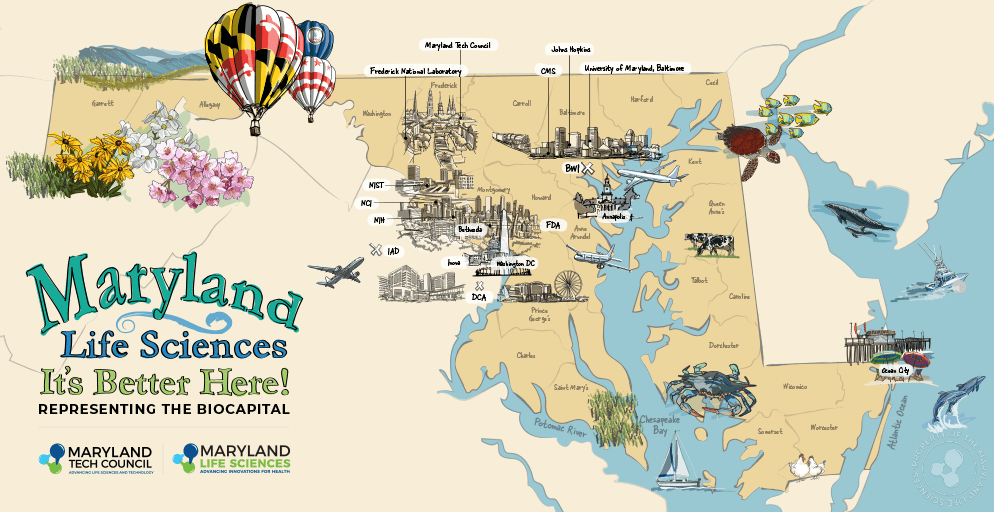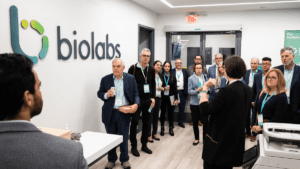
Biotech Careers: Everyone Can Take Part in
Shaping the Future
The growing life sciences ecosystem in Maryland has become a shining star in the BioHealth Capital Region. The region has seen explosive growth driven by billions of federal dollars aimed at R&D efforts to combat the COVID-19 threat. And that continued growth has become a magnet for a robust supply of life sciences talent that will continue to shape the future of the state and region.
Maryland has what Ulyana Desiderio, the Director of Life Sciences at the Maryland Department of Commerce called an “abundance of talent” and noted a rich offering of workforce opportunities across the state. While celebrating the growth of the state’s life sciences ecosystem, Desiderio said there are many opportunities to bolster Maryland’s workforce to help sustain this growth.
Maryland has a strong talent pool that needs to connect with the variety of opportunities available in the biopharmaceutical industry. While job candidates who have advanced degrees have long been the preferred choice for employers, there is room for employees without that extra training, Joe Sanchez, AstraZeneca’s Director of Science Engagement and STEM Programming R&D for North America said during the Maryland Life Sciences Bio-Innovation Conference. Sanchez is one of the co-chairmen of the Workforce Development Task Force commissioned by Maryland’s Life Sciences Advisory Board and the Maryland Tech Council, which has examined the state’s available talent pool for these expected jobs and identified initiatives that would grow homegrown talent.
In order to cultivate the notion that there are employment avenues available to individuals without advanced degrees, Sanchez suggested greater efforts need to be made to educate “talent and talent influencers on the breadth of careers in the industry.” He noted that oftentimes when jobs with pharmaceutical companies are advertised, they are typically coupled with photographs of people in white coats working in a lab. And that gives off a false impression that the industry is only accessible to multi-degreed expert scientists, Sanchez said.
Some measures that can be taken to address that include an increase in experiential learning, as well as skill-based training, such as an increase in internships, apprenticeship programs, or industry collaborations with academia, Brian Stamper, Senior Director of Manufacturing at Kite Pharma and a co-chair of the Task Force, added. The industry is not just looking for scientists, Stamper said. They are also seeking out those who have diverse educational backgrounds and training levels.
And that’s a tactic that GlaxoSmithKline has taken to heart. KaShauna Rohlehr, Associate Director – Alliance, Program and Project Management at GlaxoSmithKline, pointed to an apprentice program launched by the pharma giant. The program crosses various functions within the business, including quality, metrology/calibration and manufacturing. Rohlehr, based at the company’s Rockville offices, noted that the apprentice program does not simply aim for college-level students. Primarily, it reaches out to those students in their last year of high school, or first-year students in associate degree programs.
“It’s been tremendous. We’ve been able to go into Montgomery County Schools and work with seniors who feel that a traditional four-year degree is not for them,” Rohlehr said. “We’ve been able to give them opportunities to come into GSK and work. We pay them full time. We pay them to go to school and they get full-time benefits… We share with them that biotech is not just about working in the labs.”
Kite Pharma is also participating in an apprenticeship program. Stamper said the company, which will see its Frederick County cell therapy manufacturing facility come on line in the first half of 2022, noted partnerships with area schools like Hood College, where they are not only establishing training partnerships, but also incorporating cell therapy fundamentals into that school’s curriculum.
Another method GSK uses is its employee-led recruitment program, which Rohlehr described as a network of employee ambassadors. These ambassadors, of which she is one, promote biotech at high school and college events. They also attend professional organization meetings and conferences to highlight the opportunities of working at GSK and beyond.
The company is also partnering with the county to implement an externship program with area high school teachers, Stamper said.
Sanchez noted that AstraZeneca is also undertaking similar methods in reaching out to students in high school and even younger, reaching into middle schools, through school visits and standards-aligned virtual STEM programming. He noted students involved in the UK apprenticeship programs are balancing their school schedule to work at the company and get their foot in the door, similar to the “co-op” model here in the U.S.
To bolster the state’s ecosystem even more, Sanchez issued a stark reminder of the vastly important role Maryland’s life sciences community has played in combating the ongoing COVID-19 pandemic.
“The biopharmaceutical industry has just stepped up to help save the world from a horrible pandemic. We have the stage and attention of many who may be considering a career in an impactful industry such as ours. The time is now to out-hustle the other industries and capture the hearts and minds of our potential future colleagues,” Sanchez said.
Rewatch the entire panel from the 2021 Bio Innovation Conference below…







